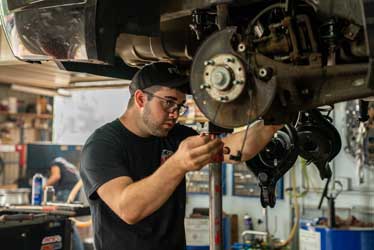All Categories
Featured
A properly maintained engine is the essential to your auto's longevity and optimal efficiency. Routine engine tune-ups not just improve fuel effectiveness however additionally reduce the chance of unforeseen breakdowns. Whether you're a cars and truck enthusiast or a person that simply intends to stay clear of pricey repair services, these engine tune-up tips will maintain your car running like a dream.

- Change the Spark Plugs. The spark plugs ignite the air-fuel blend in your engine, and their effectiveness directly influences engine efficiency. In time, trigger plugs can wear, leading to misfires, reduced fuel economic situation, and sluggish acceleration.
Throughout a tune-up, check and change spark plugs if they reveal indications of wear, such as residue build-up, corrosion, or cracks. Depending upon your car, trigger plugs may require to be changed every 30,000 to 100,000 miles.
- Examine the Ignition System. Your vehicle's ignition system, which consists of the ignition coils, representative, and cords (if suitable), is in charge of delivering the trigger that powers your engine. Damaged ignition elements can trigger beginning problems and rough engine operation.
Look for damaged or worn parts and replace them throughout your tune-up. Making certain a healthy and balanced ignition system will certainly boost engine dependability and performance.
- Clean or Replace the Air Filter. A clean air filter allows your engine to "breathe" correctly by guaranteeing a steady flow of clean air. Over time, dust and particles can clog the filter, lowering air movement and impacting gas efficiency.
Inspect the air filter during a tune-up and replace it if it's dirty. For chauffeurs in messy or contaminated areas, air filters may require to be altered extra frequently.
- Evaluate and Tidy the Gas System. The gas system, including the fuel injectors, fuel pump, and gas lines, can gather down payments with time, decreasing fuel distribution and engine efficiency. Make use of a gas injector cleaner or have your system skillfully cleaned during a tune-up to bring back correct capability.
On a regular basis maintaining your fuel system makes certain better burning and optimizes your engine's effectiveness.

- Adjustment the Engine Oil and Oil Filter. Engine oil is vital for lubrication, cooling, and reducing rubbing between moving parts. Over time, oil degrades and accumulates debris, losing its effectiveness.
Throughout a tune-up, replace the engine oil and oil filter. Following the manufacturer's referrals for oil kind and adjustment intervals is important to keeping your engine in optimum condition.
- Inspect the Belts and Tubes. The belts and hoses in your engine area play crucial functions in powering components like the alternator, water pump, and air conditioning system. Put on and tear gradually can bring about cracks, fraying, or leakages.
Check the condition of belts and pipes throughout your tune-up and replace any that reveal indicators of damage. Proactively dealing with these problems can protect against expensive fixings and unanticipated failures.
- Test the Battery and Electric System. A weak or stopping working battery can leave you stranded. Throughout your tune-up, test the battery's voltage, evaluate the terminals for rust, and ensure the connections are limited.
Furthermore, have the generator and starter inspected to ensure they're operating correctly. Resolving electric system issues early can save you from bothersome surprises.
- Check the Air Conditioning System. The air conditioning system avoids your engine from overheating, which can trigger extreme damage. Throughout a tune-up, evaluate the radiator, pipes, and water pump for leakages or use.
Flush and change the coolant if it's dirty or has actually surpassed its advisable life span. Correct cooling system maintenance aids your engine operate within its optimal temperature level array.
- Address Dashboard Warning Lights. Modern cars are furnished with innovative diagnostic systems that brighten cautioning lights when concerns develop. If your dashboard presents any type of advising lights, such as the check engine light, address them during the tune-up.
A specialist mechanic can utilize analysis devices to identify and take care of the problem, preventing little issues from intensifying.
- Keep Your Engine Clean. A clean engine runs cooler and is simpler to check for prospective problems. Remove dirt, oil, and gunk from your engine bay throughout a tune-up. Utilize a degreaser and a mild brush for cleansing, and prevent spraying water directly on electrical components.
Verdict: Tune-Ups Are the Trick to Engine Long Life. Routine engine tune-ups are a financial investment in your automobile's wellness, performance, and performance. By replacing worn parts, cleaning up vital systems, and attending to issues early, you'll guarantee your auto remains trusted for many years to find. Whether you're dealing with the tune-up yourself or taking your vehicle to a trusted auto mechanic, following these suggestions will keep your engine running at its best and aid you stay clear of unforeseen fixings. A well-maintained engine does not simply save you money-- it assures assurance when traveling.
Latest Posts
Find the Greatest Auto Repair Offers in Montclare, Chicago
Uncover Cost-Effective Auto Repairs with Montclare’s Exclusive Service Specials
Understanding Roof Covering Guarantees: What Homeowners Need To Know
More
Latest Posts
Find the Greatest Auto Repair Offers in Montclare, Chicago
Uncover Cost-Effective Auto Repairs with Montclare’s Exclusive Service Specials
Understanding Roof Covering Guarantees: What Homeowners Need To Know